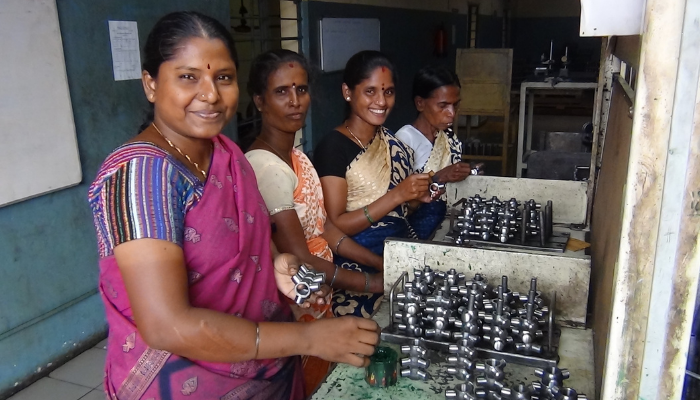Written By: Karan Arora
What is the PoSH Act?
The Sexual Harassment of Women at Workplace (Prevention, Prohibition and Redressal) Act, 2013, commonly referred to as the ‘PoSH Act’ is an Indian law enacted with the objective of making workplaces safer for women by preventing, prohibiting and redressing acts of sexual harassment against them in the workplace. The law was made effective in the whole of India on December 9, 2013, by the Ministry for Women and Child Development.
What is ‘Sexual Harassment’ under the Act?
Section 2(n) of the Act defines sexual harassment to include the following unwelcome acts:
i. Physical contact and sexual advances.
ii. A demand or request for sexual favours.
iii. Making sexually coloured remarks.
iv. Showing pornography.
v. Any other unwelcome physical, verbal or non-verbal conduct of sexual nature.
These acts may be considered unwelcome if the woman expresses her discomfort upon the commission of these acts, or does not consent to them. Additionally, the following circumstances may amount to sexual harassment if they are connected with any of the acts or behaviour mentioned above.
i. Implied or explicit promise of preferential treatment in employment.
ii. Implied or explicit threat of detrimental treatment in employment.
iii. Implied or explicit threat about present or future employment status.
iv. Interference with work or creating an intimidating or offensive or hostile work environment.
v. Humiliating treatment likely to affect health or safety.

Who is required to comply?
You are an employer for the purposes of this Act if you are:
i. The head of any department, organisation, undertaking, establishment, enterprise, institution, office, branch or unit of the Government or a local authority.
ii. The person responsible for the management, supervision and control of any workplace that is not covered under point (i).
iii. The person or household who employs a domestic worker in a house or any kind of domestic dwelling, regardless of activities performed by the domestic worker, the time-period they are employed for, or whether they are working full-time or part-time.
This leads to the question – what is a ‘workplace for the purposes of this act? Section 2(o) defines the term “workplace” to include:
i. Any department, organisation, undertaking, establishment, enterprise, institution, office, branch or unit which is established, owned, controlled or funded by either the Government, a local authority (such as a Municipal Corporation), a Government Corporation, or a Government run co-operative society.
ii. Any private sector organisation, private venture, undertaking, enterprise, institution, establishment, society, trust, NGO, or a service provider, that carries out commercial, professional, vocational, educational, entertainment, industrial, financial or health-related activities.
iii. Hospitals and nursing homes.
iv. Sports institutes, stadiums, sports complexes and competition venues that may be used for training, sports or any other related activities.
v. Any place visited by an employee arising out of during the course of their employment. This includes any transportation service provided by the employer for visiting any such place.
vi. A house or any domestic dwelling.
vii. Any enterprise, commonly said to belong to the unorganised sector, which is owned by individuals or self-employed workers and engaged in the production of sale of goods or services.
Who are the beneficiaries?
The PoSH Act protects women in the workplace from sexual harassment. All women employees regardless of whether:
i. They are employed regularly, temporary, ad hoc or daily wage basis.
ii. They are employed directly or through an agent or a contractor.
iii. They are employed with or, without the knowledge of the principal employer.
iv. They are employed for remuneration or on a voluntary basis.
v. The terms of employment are expressed or implied.
The above-mentioned are protected under the PoSH Act. The PoSH Act also applies to women contract workers, probationers, trainees, apprentices and interns.

What does the PoSH Act mandate?
i. Provision of a safe working environment in the workplace: The PoSH Act makes employers responsible for ensuring that the workplace is safe for its employees. In this regard, they must employ measures to ensure that their employees are safe from both employees and non-employees who might enter the workplace (delivery boys, for example). This mandate is not limited to the official workplace – it also includes any vehicles used by the company, and any third-party sites visited by the employees.
ii. Constitution of an Internal Committee in every workplace with more than 10 employees: The Internal Committee (IC) is one of the two redressal bodies under the PoSH Act. Any employer of a workplace with 10 or more employees is required to constitute an IC. The IC is responsible for hearing and redressing any complaints pertaining to sexual harassment in such workplace.
iii. Constitution of the Local Committee in every District: While only workplaces with 10 or more employees are required to constitute ICs, this does not mean women working at all other workplaces do not get protection under the PoSH. The PoSH Act also requires the constitution of a Local Committee (LC) in every District which is responsible for hearing and redressing complaints of sexual harassment from workplaces that may have fewer than 10 employees. The LC also redresses complaints in the case such complaint is against the employer of a workplace themselves.
iv. An in-depth inquiry into all complaints of sexual harassment: The IC/LC, as the case maybe, is required to conduct an inquiry into every complaint of sexual harassment in accordance with the provisions of the service rules applicable to the respondent within ninety days (90 days) from the submission of the complaint. Upon the completion of an inquiry, the IC/LC is required to prepare a report of its findings. If the allegations of sexual harassment are proved, the IC/LC may recommend the employer or the District Officer to take action against the accused.

v. Organisation of workshops and awareness programmes at regular intervals for sensitising the employees with the provisions of the Act: The PoSH Act places a duty upon each employer to organise periodic sensitisation workshops for all their employees so they are well versed with the provisions of the Act, the organisation’s redressal procedures and the consequences of engaging in acts that constitute sexual harassment. Such workshops/training sessions must be organised by individuals who are experts or experienced in POSH sensitisation.
vi. Punishment for false and malicious complaint and false evidence: The PoSH Act takes into cognizance, false and malicious complaints and provides for strict action against them. If the IC/LC finds that an allegation of sexual harassment is false, it can recommend the employer or District Officer to take action the woman or the person who has made the complaint in accordance with the provisions of the service rules applicable to them.
What are the repercussions of not complying with the PoSH Act?
The PoSH Act takes a firm stand against non-compliance of its provisions. If an employer fails to either constitute an Internal Committee, or discharge any of the other duties placed upon them under the act, they shall be punished with a fine which may extend to fifty thousand rupees (Rs. 50,000).
In the event an employer contravenes the provisions of the PoSH Act a second, they may be either fined twice the amount as the fine for the first contravention, or face cancellation of their license, permit or registration for carrying on their business or activity.
Are there any other reasons why a company should comply with the PoSH Act?
Certainly. Besides the legal and financial costs of non-compliance with the PoSH Act, an unsafe workplace can lead to general impairment of your employee’s psychological well-being and reduce your productivity. Workplaces with a greater number of instances of workplace harassment also suffer from higher employee turnover rates.
Effective compliance with the PoSH Act makes workplaces safer, displaces the fears and discomfort of employees, increases employee satisfaction, reduces employee turnover and saves companies from other costs associated with sexual harassment.
About The Author: Karan Arora is a final year law student with a keen interest in labour laws and labour compliance, Bangalore.
Featured image has been used for representational purposes. Credit: ILO Asia Pacific – Sundaramoorthy Thimmarayan/FLICKR
Ungender Insights is the product of our learning from advisory work at Ungender. Our team specializes in advising workplaces on workplace diversity and inclusion. Write to us at contact@ungender.in to understand how we can partner with your organization to build a more inclusive workplace.










